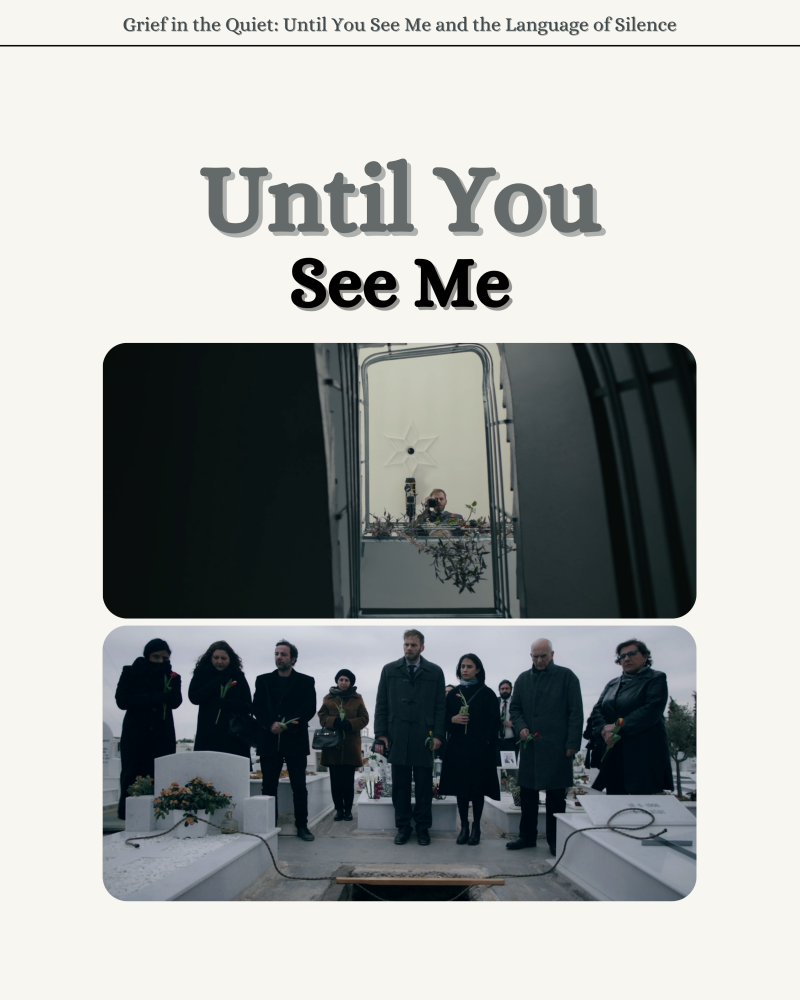Until You See Me - Eleanna Santorinaiou | Runtime: 15 minutes | Genre: Comedy/Drama
Logline: At his mother’s funeral, Petros doesn’t cry — he films. As others question his silence, he retreats inward, processing grief on his own terms. "Until You See Me" is a quiet, affecting portrait of loss, memory, and the private ways we mourn.

Grief doesn’t announce itself with grand gestures. It lingers in the corners of a room, in the taste of reheated leftovers, or in the familiar clunk of a Hi8 camcorder. Eleanna Santorinaiou’s "Until You See Me" is a tender, unembellished meditation on mourning — one that quietly subverts the cinematic clichés of loss in favour of something more intimate, and more truthful.
Petros, the film’s protagonist, arrives at his mother’s funeral not in tears but in observation. Armed with his old camcorder, he films everything — not out of detachment, but as a way of clinging to the moment without confronting it. Stones, sea, flowers, faces. The rituals unfold around him, but the expected emotional outpour never arrives. His silence becomes suspect. Friends and family interpret his restraint as coldness, asking — with varying degrees of gentleness — why he’s not crying.
The brilliance of Santorinaiou’s direction lies in her refusal to answer that question with a single dramatic beat. Instead, grief is presented as a private, staggered process — one that doesn’t necessarily respect the timeline of funerals, or the expectations of others.
When Petros eventually breaks, it’s not under the weight of eulogies or condolences, but in the quiet solitude of his kitchen, eating the last meal his mother prepared for him. It’s a devastatingly human moment: he chews, he cries, he sobs. The food becomes a proxy for presence, and the act of eating, an unwitting goodbye.
The performance at the film’s centre is impressively restrained. There’s no histrionics, no overwrought soliloquies — just a man trying to make sense of something unspeakable. That restraint echoes throughout the filmmaking itself. The handheld camerawork — particularly the footage Petros shoots — adds a sense of tactility and emotional proximity. The grainy texture of the Hi8 footage isn’t just nostalgic; it’s symbolic of Petros’s inner world, blurred and fragile, suspended between memory and present.
But "Until You See Me" is not solely a portrait of mourning — it’s also a quiet indictment of how society polices grief. The discomfort people feel at Petros’s lack of visible distress speaks volumes. The film subtly critiques our need to perform sadness in prescribed ways, to be demonstrative in order to be believed. Petros doesn’t comply — and in doing so, he reflects the truth of many who grieve in silence, confusion, or delay.
The closing moments, in which Petros watches childhood footage of his mother, offer a final emotional release. It’s not a climax, but a recognition — of what has been lost, and what remains. Childhood, memory, and identity are gently braided into the film’s structure, reinforcing the idea that grief is not only about the absence of someone, but the rupture of the self they helped shape.
"Until You See Me" may be modest in scale, but it leaves a lasting impression. It understands that mourning is rarely cinematic. It’s awkward, slow, internal. Sometimes, it’s just sitting alone in your kitchen with a plate of your mother’s pastitsio. Sometimes, that’s enough.
Available on Prime video with a standard subscription.
Add comment
Comments